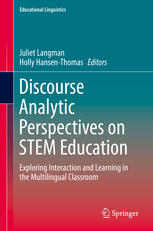

Most ebook files are in PDF format, so you can easily read them using various software such as Foxit Reader or directly on the Google Chrome browser.
Some ebook files are released by publishers in other formats such as .awz, .mobi, .epub, .fb2, etc. You may need to install specific software to read these formats on mobile/PC, such as Calibre.
Please read the tutorial at this link: https://ebookbell.com/faq
We offer FREE conversion to the popular formats you request; however, this may take some time. Therefore, right after payment, please email us, and we will try to provide the service as quickly as possible.
For some exceptional file formats or broken links (if any), please refrain from opening any disputes. Instead, email us first, and we will try to assist within a maximum of 6 hours.
EbookBell Team

4.3
68 reviewsThis volume explores the nature of discourse in secondary and upper elementary mathematics and science classrooms. Chapters examine conditions that support or hinder teachers and students, in particular language learners, in employing language as a tool for learning. The volume provides rich oral and written language examples from a range of classroom contexts to illustrate how linguistic practices affect students’ appropriation and display of disciplinary specific knowledge. Chapters further explore linguistic practices through with the support of discourse analytic models that foreground the authentic classroom data with the aim of understanding the dynamics of the classroom. The authors investigate the intersection between discourse and learning from a range of perspectives, including an examination of key concepts such as intertextuality, interaction, mediation, scaffolding, appropriation, and adaptations. This volume offers concrete suggestions on how teachers might benefit from a discourse approach to teaching in the areas of mathematics and science.